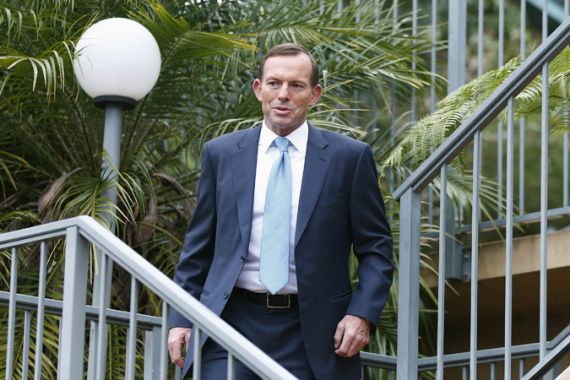Australia’s new PM vows to cut foreign aid
Prime minister-elect to cut pledges in foreign aid and will visit Indonesia to address asylum seekers issue.

A new government prepared to take control of Australia, with policies to cut pledges in foreign aid and to wind back greenhouse gas reduction measures in an effort to balance the nation’s books.
Prime Minister-elect Tony Abbott also plans to visit Indonesia soon in part to discuss controversial plans to curb the number of asylum seekers reaching Australian shores in Indonesian fishing boats.
Abbott’s conservative Liberal party-led coalition won a crushing victory at elections on Saturday against the centre-left Labor Party, which had ruled for six years, including during the turbulent global financial crisis.
The Australian Electoral Commission’s latest counting early on Sunday had the coalition likely to win a clear majority of 88 seats in the 150-seat House of Representatives. Labor appeared likely to secure 57.
The coalition announced last week that if elected it would plan to save 4.5 bn Australian dollars ($4.1 billion) over the next four years by reducing increases in its aid spending to the Australian inflation rate, which is currently less than three percent.
The outgoing Labor government said in May that Australia’s long-standing pledge to increase its foreign aid spending to 0.5 percent of gross national income by 2015-16 would be postponed by two years.
The coalition said in a statement last week that it shared Labor’s commitment to reach the 0.5 percent target “over time, but cannot commit to a date given the current state of the federal budget.”
“I have to say, there are higher immediate priorities” than reaching the 0.5 percent target, Abbott told reporters last week.
“The best thing we can do for our country and ultimately the best thing we can do for people around the world is to strengthen our economy.”
The money saved will be reallocated to road projects in the country’s three biggest cities; Sydney, Melbourne and Brisbane.
Cuts may strain Pacific islands
The plans have been condemned by opponents and aid groups, who dubbed it short-sighted and contrary to the nation’s image of global cooperation, particularly in light of Australia’s recent appointments to presidency of the UN Security Council and the G20 in 2014.
 |
| Infographic: Understanding Australia [Al Jazeera] |
New Zealand Prime Minister John Key said on Friday that cuts to planned spending will strain small Pacific island nations, a major beneficiary of Australian aid.
“These are countries that need a lot of support and help, so if there is less money coming their way, they’ll obviously feel that over time,” Key told reporters in the Marshall Islands, where he was attending the Pacific Islands Forum.
“It will certainly make the money that we spend here even more valuable.”
Abbott’s new government wants to discuss with Indonesia plans to have the Australian navy turn back Indonesian fishing boats carrying asylum seekers into Australian waters.
The coalition has proposed that the government buy old fishing boats from Indonesian fishermen to prevent them falling into the hands of people smugglers.
Labor argued that both policies could damage Australia’s relations with Indonesia, its closest neighbor after Papua New Guinea.